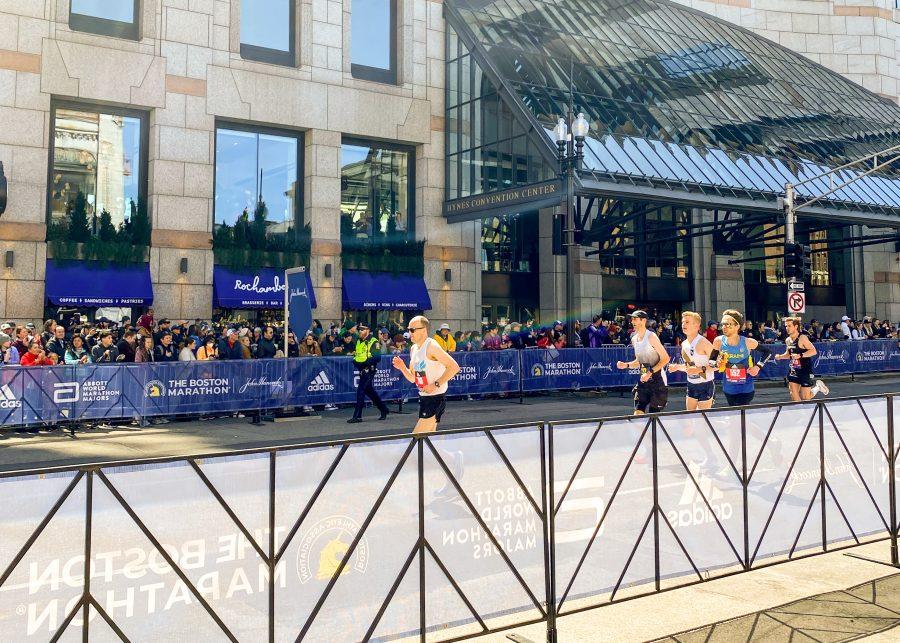The world’s oldest annual marathon, the Boston Marathon, was held on its traditional Patriots’ Day. The history of the Boston Marathon stems from the time when a Boston Athletic Association member and inaugural U.S. Olympic Team Manager, John Graham, was motivated to organize a marathon like that of the Olympic one. To match the standards of the Olympic Marathon, the distance was increased from 24.5 miles to 26 miles, shifting the starting line from Ashland to Hopkinton.
Competitors and athletes from across the states and countries flew in for the marathon. Around 30,000 participants were expected to run the 26-mile long marathon spanning from Hopkinton to Boston. Kenyan runner Peres Jepchirchir emerged victorious in the women’s elite field by giving a fierce competition to the Ethiopian runner Ababel Yeshaneh by touching the finishing line with a time of 2:21:02.
“I just believed in myself,” the 28-year-old athlete told USA Network after the race. “And when you see the end, and then you see the cup for the finishing, that’s where the strength comes.”
Evans Chebet of Kenya won the professional men’s division of the Marathon with a time of 2:06:51. “I observed that my counterparts were nowhere close to me, and that gave me the motivation and determination to hit it off and be the winner,” Chebet said to the Boston Globe. Both the men’s and women’s division titles were swept away by runners from Kenya.
After officially recognizing Bob Hall in 1975, the Boston Marathon became the first major marathon to have a wheelchair division. Daniel Romanchuk emerged as the winner in the men’s wheelchair division with a time of 1:26:58. Switzerland’s Manuela Schär bagged her fourth Boston wreath by finishing the marathon in 1:41:08.
“This one is special. I was more nervous than I usually am. Preparation was a bit difficult. I wish I had two or three more weeks for training. I didn’t quite know where I stood with COVID-19,” said Schär to the Globe.
While the marathon was a big day for athletes from around the states and countries, it also emerged as a place to display solidarity and support for different causes. Many runners ran with their national flags to represent their country and community. Tiffany Chenault is an African American recreational runner. In Chenault’s words, “running is really a microcosm of a larger society. So, even though it should be all welcoming and inclusive, it’s not.”
Ukrainian runner Igor Krytsak stood near the finish line at Copley Square, holding his country’s flag that read, “I am Ukrainian and I’m proud of it.” He said to The Boston Globe that it is not just a war in Ukraine, but thousands of people are dying, and this war “has implications for the world. Our people are protecting all people of the world.” Krytsak flew all the way from Ukraine, with special permission from the government to leave the country, so that he could run in the Boston Marathon.
The city also commemorated the ninth anniversary of the 2013 Boston Marathon Bombings. State and city leaders stood in solidarity to celebrate the city’s resiliency and community support. Henry Richard ran the marathon for his brother Martin Richard, who was one of the 2013 Boston Marathon bombing victims. “I’m just so glad I could finally be here,” he said. “So much emotion. I know Martin would have been doing it with me… I did it for both of us,” said Richard to NBC 10Boston. UMass Boston alumna Krystle Campbell was another one of the victims of the Boston Marathon bombing. In her memory, the Krystle Campbell Scholarship was founded to support students pursuing a degree in Business at the University of Massachusetts.
UMass Boston students expressed their feelings and excitement about the Boston Marathon. “The Boston Marathon was truly a unique experience because of how incredible all the athletes were!” said Daniela Maria Kefalas, a junior studying International Relations at UMass Boston. “Watching everyone cheering and encouraging the runners no matter who they were allowed for such a warm and supportive atmosphere. It was heartwarming to see people so happy to have managed to run the Boston Marathon, and the interactions between the runner and their families were precious.”
The Boston Marathon recapped
Boston Marathon runners approach the finish line at Copley Square on Monday, April 18, 2022. Photo by Kaushar Barejiya / Mass Media Staff
About the Writer
Kaushar Barejiya, News Editor

